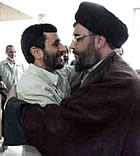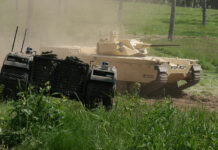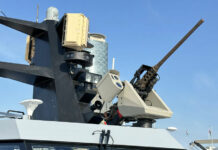Hezbollah won the Second Lebanon War by achieving a propaganda victory over Israel, a Harvard University study has concluded. Israel’s defeat came not at the hands of Hezbollah, however, but through the internal contradictions of being the region’s sole functioning democracy in the Internet age. “An open society, Israel, is victimized by its own openness,” Marvin Kalb and Dr. Carol Saivetz of the Shorenstein Center of Harvard University concluded in their research paper, “The Israeli Hezbollah War of 2006: The Media as a Weapon in Asymmetrical Conflict“.
The flagship of Hezbollah’s media empire is its TV satellite channel, Al-Manar, which was set up in 1991 with aid from the Iranian Revolutionary Guards. The channel’s broadcasts are slanted toward propaganda and reflect Hezbollah’s Iranian-inspired ideology and political agenda. To win its battle for hearts and minds, Hezbollah employs terminology expressing Iran’s extremist Shi’ite Islamic worldview. Special emphasis is put on fostering the values of jihad (holy war) and shahadah (death as a martyr for the sake of Allah) to justify the campaign of terrorism and guerilla warfare waged by Hezbollah and the Palestinian terrorist organizations against Israel.
 Unfortunately, western media, even including much of Israel’s, have ignored Hezbollah’s weak point- its complete dependence on Tehran’s radical Khomeinistic Shiite doctrine, which contradicts Hezbollah’s basic pragmatism- fighting for Lebanon’s nationalism.
Unfortunately, western media, even including much of Israel’s, have ignored Hezbollah’s weak point- its complete dependence on Tehran’s radical Khomeinistic Shiite doctrine, which contradicts Hezbollah’s basic pragmatism- fighting for Lebanon’s nationalism.
Nevertheless, the organization waged a propaganda campaign using sophisticated psychological warfare to attack its Israeli target audience lowering public morale, cause panic, increase fear of its rocket fire and enhancing Hezbollah’s image as a strong opponent, possessing impressive operational capabilities.
Al-Manar TV, which survived and remained on the air, even after the Israeli air force bombed its building in a southern suburb of Beirut has broadcast factual information throughout the war, mixed shrewdly with propaganda about its rocket fire and the successes it achieved in battle. Devoid of any reciprocal media balance by Israel, Hezbollah’s broadcasts served as a source for international media. Hassan Nasrallah was interviewed six times during the war and his statements were often quoted, especially in Lebanon, other Middle Eastern countries and around the world. To a great extent, during the war he succeeded in taking over TV screens, even in Israel itself, thus achieving an enormous psychological advantage over the local media and its rather clumsy official spokespersons.
Hezbollah’s main propaganda achievements were the result of its ability to prevent foreign journalists, Arab and Western alike , from directly accessing the combat zones and thus keep real-time information away from them, making it impossible for them to cover only topics which were compatible with the organization’s propaganda strategy. According to a postwar study by the Israeli Intelligence and Terrorism Information Center the myth of Hezbollah’s “divine victory” concept of the campaign, was based on three main elements:
- The IDF’s failure to stop or significantly reduce Hezbollah rocket fire throughout the war;
- The harsh internal criticism expressed for the IDF and the government when the war ended: the many failures and mistakes exposed were used and are still being used by Hezbollah as grist for its propaganda mill.
- Israel’s achievements and Hezbollah’s failures in the war were not sufficiently emphasized within Israel itself because of overblown internal criticism. Therefore, they were not always picked up in Lebanon and the Arab world, with the result that they did not succeed in undermining Hezbollah’s victory myth.

However, as the dust settled in the months following the war, and as the Lebanese internalized the destruction wrought upon their country, the myth of the “divine victory” began to crack, as internal criticism increased because of the high price Lebanon was forced to pay for Hezbollah’s military escapade. Even Iran has voiced its displeasure over Nasrallah’s war, as it destroyed, much too prematurely, Tehran’s painfully constructed forward base, before Iran could use it as a viable deterrent against US-Israeli attacks on its ambitious nuclear program.
Unfortunately, the public mood within Israel’s society was already too much involved in the postwar campaign of self-internecine search for culcables, to exploit the opportunity, which already presented itself on it’s neighbor’s doorstep.
The reason for Israel’s strange behavior lies in a fundamental development, which has evolved over decades and exacerbated since Saddam Hussein’s Scud offensive on Israel’s rear, in Spring 1991.
In his highly provocative lecture, during last week’s Annual Conference for National Security held by the Herzliya-based Fisher Brother’s Institute for Air and Space Strategic Studies, Dr. Guy Bechor made some soul-searching observations over the new Arab concept in fighting Israel’s military might. Dr Bechor, a leading Israeli expert in Arab affairs, expounded, that once the Arab regimes and organizations around Israel had concluded, that a classic military war waged by an Arab army against the IDF power base, would inevitably bring about their defeat, such option was no longer feasible. Some nations, like Egypt and Jordan, opted for peace with Israel by lack of choice, while others, and particularly Islamic organizations, started seeking a new method of warfighting. The result was a rather sophisticated “resistance” model that was used in the last Intifada and during the Second Lebanon War, shifting the fighting from classic military confrontation to the Israeli home front, using missiles, rockets and especially the notorious, but highly successful, suicide bombers reaping havoc in Israeli cities.
Inevitably, the impact of missiles and rockets on Israel’s public consciousness has been overrated beyond its actual effectiveness, enhanced mostly by irresponsible media reports. The sober fact indicates that during Operation Desert Storm 1991, with 39 Scuds targeting Israel, the total of the launched missiles that landed on Israel’s territory, while causing extensive property damage, resulted only in two directly related deaths. In addition to two deaths by Scud shrapnel, a total of seven Israelis died of suffocation from improper use of their gas masks.
At the time, civilian reaction while serious, did not cause not panic, due to the impression that US coalition was fighting its war for them in Iraq and that the leadership had matters under control. There was also a lull between attacks, which enabled conducting normal life in between missile alerts.
The situation altered considerably last summer. During that war, from July 13 to August 13, Israel Police reported 4,228 rocket impacts inside Israel from rockets fired by Hezbollah. No geographical area in the world has sustained such a large quantity of rocket strikes since the Iran-Iraq war in the early 1980s. Public reaction was devastating. Over a million Israelis were huddling in shelters, for nearly six weeks, no central control was visible and panic raged, as there were insufficient pre-impact warnings given, enabling normal life conduct in between alerts.
However, two important facts were withheld from the public: Most rockets fired by Hezbollah at Israel were taken from the Syrian arsenals rather than from Iran and only one-fourth of the rockets that landed within Israel actually landed within built-up areas. Compared to the massive barrage, sustained over nearly six weeks, the results were rather unimpressive. Israel’s losses and damage from Hezbollah rocket attacks included civilian 53 fatalities, 250 severely wounded, and 2,000 lightly wounded, mostly Post Traumatic Stress victims. There was extensive damage to hundreds of dwellings, several public utilities, and dozens of industrial plants. But the most damaging aspect was that over one million Israelis were forced to live near or in shelters or security rooms, with some 250,000 civilians evacuating the high-risk north, relocating to other areas in the country, considered safe. The latter became one of the reasons for the public outrage over Ehud Olmert’s deplorable conduct of the war.
Still, much could have been saved, if Israel’s leadership had excreted its control over the media. Hezbollah was able to skillfully exploit the technological innovations wrought by the internet and the demands of the international news cycle, by constructing the narrative story line for the “first really ‘live’ war in history”, where “the camera and the computer” became unrestricted “weapons of war.” As a tight, centrally controlled sect, Hezbollah retained almost total grip of the daily message of journalism and propaganda, thus shrewdly manipulating its image to the world. No reporter was allowed into the zone of battle by Hezbollah media agents, which kept strictly manipulated control over any visits to places where maximum damage was inflicted on what seemed civilian properties.
On the Israeli side, the situation was chaotic. While officials made mostly awkward and ineffective efforts to control and contain media coverage, these essentially failed and the press quickly gained unfettered access to the battlefield. Network anchors, representing cable TV operations, ranging from Al Jazeera to Fox news, managed to set up their cameras along the Israeli-Lebanese border, right along IDF forces going in and out of Lebanon. The result was devastating to public morale, which was bombarded by uncensored information, usually incorrect, or even manipulative, by rating-competitive news networks. “In strictly military terms, Israel did not lose to Hezbollah in this war, but it clearly did not win. In the war of information, news and propaganda, the battlefield central to Hezbollah’s strategy, Israel lost this war,” Kalb and Saivetz concluded in their study.
A closed society can control the image and the message that it wishes to convey to the rest of the world is, by far more effectively than that of an open democratic society, especially one engaged in an existential struggle for its survival. Under critical situations, like asymmetric warfare, a democratic society quickly becomes the victim of its own openness. During the war, no Hezbollah secrets were disclosed, but in Israel secrets were constantly leaked, rumors spreading like wildfire, so that leaders frequently felt obliged to issue ill-prepared and hasty statements, often based on incomplete knowledge. Journalists and pseudo-experts were driven by competing news networks to publish and broadcast unsubstantiated information, contradicting factual information-with devastating moral effect on the public. An open society, buffeted by the crosswinds of reality, rumor, self criticism and irresponsible revelation, normally will convey the impression of total disorder, chaos and uncertainty. Under these circumstances, Israel became unfortunately “victimized by its own openness.”
This deplorable situation inevitably brought about serious repercussions, which could become critical in a future crisis situation. Much of this perception is brought about by the unfettered revelations of the Winograd Commission reports. Results can already be clearly visible in the reaction of the Arab world.
“The Winograd report stressed that Hezbollah was victorious and that Israel is beatable,” a senior spokesman for the Iranian-backed group told the organization’s Al-Manar television channel. In fact, the shockwaves going through Israel, like the commissions of inquiry, political turmoil and social instability are already enhancing Nasrallah’s perception, which aims to see Israeli democracy destroying itself. Nasrallah and his Iranian mentors clearly believe that the most important aspect is to shift the war deep into Israeli territory “and to pierce its castle walls.” The shockwaves in Israel, the outcry and the loss of a sense of security already mark a psychological triumph for Islamic Jihad”.
While all this is going on, senior analysts warn, the Israeli society is unfortunately busy as usual, with internal battles, cruelly tearing off its own limbs in regarding the past and with self -hate, whose origins are hard to fathom, all this, while the imminent threats are already clearly visible.
The Iranian deputy interior minister has explicitly warned, that in the event of an American attack, Iran would fire tens of thousands of missiles at Israel; Syria is moving and positioning thousands of missiles close to the border with Israel; Hezbollah has completed the replenishment of its missiles and rockets arsenal, which is capable of striking at the heart of Israel and Hamas has transferred tons of explosives and rockets into the Gaza Strip in an attempt to create a balance of power with the IDF.
The dominant question is therefore asked by military experts, whether the IDF is capable of fighting a multi-frontal war within a foreseeable time. Under its new chief, Lieutenant General Gabi Ashkenazi, the IDF is investing huge efforts to recover its basic operational faculties. Filling the gaps in emergency depots and holding large-scale, realistic military exercises, with combined forces is now the high-priority order-of-the-day. But there are some crucial issues which have to be resolved without delay. Can Israel’s political leadership sustain another crisis management, without taking some drastic steps to redress the recent failures? Does Israel have its own missile arsenal for creating an adequate and viable deterrence against Iran, Syria or other “rogue” nations, which might still provoke a military foray, taking advantage of Israel’s ostensive weakness? There are no simple answers to these questions, but some of these will, no doubt, be found in Washington.
















